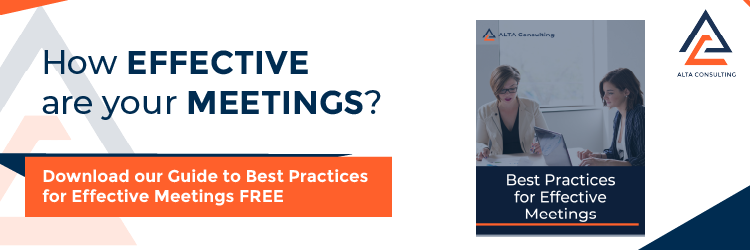
If you're having trouble efficiently managing and coordinating operations in your professional services company, resulting in missed targets and reduced revenue, a business growth consultant at ALTA Consulting can help. Don't let feelings of disorganization and unachieved goals hold you back. Learn how a mature and effective meeting cadence as part of a growth strategy framework can take your company to new heights and lead to increased success and revenue.
The Importance of a Cadence for Professional Services
Professional services companies have a high degree of interdependence among their functions, such as sales, resources, skills, people, leadership, client relationships, talent, service execution, and finance/operations. Achieving optimal performance and results necessitates a high level of coordination among these key areas. A mature rhythm or meeting cadence is critical in achieving alignment and improving overall performance.
A well-established process can enhance accountability and transparency within the organization by establishing clear expectations and responsibilities for each department. It can also streamline the connection between sales and available resources and capabilities and link the company's human resources strategy with recruitment, skill gaps, and talent management considerations.
As the company's cadence matures, functional excellence becomes more evident, and the company can move up in levels of maturity. This will result in improved coordination among the departments, improved performance and results, and a more effective and efficient organization.
Higher Levels of Business Maturity Through Aligned Processes and Metrics
As your company's meeting cadence matures, you will experience a gradual improvement in the performance and efficiency of your departments, progressing through these stages of maturity:
Initiated: This is the starting point for a company where processes are ad hoc and not yet established. The company is still figuring out how to organize and operate effectively.
Piloted: At this stage, the company has begun to establish repeatable processes, but they are still being tested and refined. They may be used only in a limited way or in specific situations.
Deployed: Once processes have been tested and refined, they are deployed as standard operating procedures across the entire organization. This stage marks a significant step forward in organizational maturity.
Institutionalized: At this stage, not only are the processes in place, but there are also aligned metrics and controls to ensure consistency and effectiveness. The organization is now able to monitor and measure its performance to make data-driven decisions.
Optimized: The final stage is fine-tuning. The company has reached a level of maturity where the most challenging processes are defined. Now, they’re optimizing these processes and policies to enhance efficiency and effectiveness.
Mastering the Art of Meetings: Understanding the Types and Their Purposes
Profitability and maturity go hand in hand for professional services firms. The most successful companies are those that have a strong and mature rhythm for their business operations. This includes a well-defined cadence of meetings, from daily check-ins to short-term planning and long-term strategy discussions.
Having the right meetings in place is crucial for success, including daily "huddles" for quick check-ins, weekly and monthly meetings for short-term planning, and quarterly or annual strategy meetings for deeper strategic discussions.
One common issue for companies is not having enough strategic discussions. Often companies are too focused on day-to-day operations and not enough on long-term planning, which can hinder growth and profitability. By implementing a strong meeting cadence and prioritizing strategic discussions, companies can improve their maturity and overall success.
The Essential Guide to 4 Meeting Types to Maximize Performance
Here are some recommended meetings to ensure a strong and mature rhythm for your business operations:
Daily Meetings:
Quick check-in to discuss what's on the agenda for that day
Weekly Meetings:
Review of pipeline and resources
Discussion of business development and forecasting of opportunities
Meeting to review project delivery
Monthly Meetings:
Meeting at leadership level to discuss progress and plans
Meeting at functional level to review specific areas of the business
Quarterly/Annual:
Strategy meetings to discuss long-term plans and direction
Execution meetings to review progress on key initiatives and overarching goals.
3 Key Principles for Successful Meetings and Driving Performance
Principle 1: Radical Personal Accountability
This is a critical principle in meetings as it promotes balance in motivation, control, and commitment vs. compliance. Meetings should facilitate participants in arriving at the right answers and encourage creative alternatives and different ways of approaching things. It also provides a platform for giving feedback.
Principle 2: Creating Stretch
Meetings should aim to push the team to do more, but not too much more. This can be achieved by driving performance and asking people to work in areas where they may not be comfortable, thus promoting learning.
Principle 3: Tracking Commitments
Meetings should track commitments and productivity patterns and anti-patterns. It's important to see the correlation between what was said and when it was done. This helps to identify individual and team patterns of meeting or not meeting commitments and the rate of progress.
3 Big Meeting Pitfalls That Hold You Back
Overcommitment and lack of progress. It is important to assess whether a task is still a priority and if it was the right task to begin with.
Prioritizing the wrong tasks. Consider how you are organizing your meeting. Don’t cover the everyday tasks if more pressing priorities are present.
Not delegating. Meetings are an ideal place to delegate to create growth opportunities for team members and identify what resources or help they may need.
Take the Next Step: Book a Consultation With ALTA Consulting
By adopting a refined and efficient meeting cadence as part of a growth strategy framework, you can streamline operations, boost productivity, and reach your revenue targets with greater ease and speed. Book a call with one of the business growth consultants at ALTA Consulting and start achieving more.


Comments